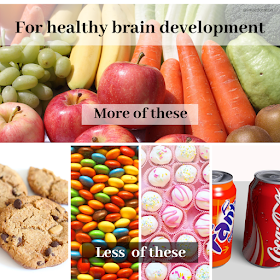Before you let
your pre-schooler eat that lolly or chip, consider that many studies have found
a link between children’s diet and academic performance. Most have found
that high academic achievement is related to a healthy diet low in energy
dense, nutrient poor food.
This means that snacks, fast food and sugary drinks should be limited if children are to do well in school. Instead, children should be encouraged to eat more healthy foods such as fruit and vegetables.
 |
| What is the link between sugar and academic achievement? |
Are children getting
enough fruit and vegetables?
The
current concern about children’s diet is that not many children are eating
enough fruit and vegetables. According to the NSW
Government Health Statistics, 73% of children
between the ages of 2 and 8 years are eating the recommended amount of fruit.
However, only 9% of them are eating the recommended amount of vegetables. As
children get older, this amount falls to 56% and 4.5%, respectively.
 |
| Feed your child more vegetables and fruits |
Not
only does a diet low in fruit and vegetables have health consequences later in
life, it can also affect children’s academic abilities.
Researchers
have compared 8 to 15 year old children’s intake of
fruit, vegetable, take away food, sugary drinks, and breakfast to their NAPLAN
scores in years 3, 5, 7 and 9. The result was that children who had a high
intake of vegetables had higher scores whereas those who drank a large amount
of sugary drinks had lower scores.
Train
children to eat healthy as early as possible
There is an
urgent need to start children eating healthy early. What children eat in the
first few years of their life can predict academic achievement in later years.
One study
looked at children’s diet in the first three years of life then compared it
with their standardised test scores at 10 and 12 years of age. Diet was sorted
into seven groups: wholegrain, vegetables, fruits, protein/meat ratio, dairy, snack
foods and sweetened drinks.
A link was found
to eating more wholegrain, vegetables, fruits, proteins and dairy and a lower
intake of snack and sweetened drinks to higher scores in the standardised tests.
There was also a link to eating greater amounts of dairy and fruits to higher
academic scores.
A healthy eating
habit that starts early could be one that stays with children for a lifetime.
This could help many children to do well in school and get good grades
throughout their schooling years, and maybe beyond that.
 |
| Healthy eating starts early |
The one thing to avoid
Sweetened
drinks such as cordials and soft drinks seem to be one of the culprits that is
linked to low academic achievements. To test this further, researchers
studied pregnant women’s intake of sugar, drinks and fruit
consumption and how they are linked to their children’s thinking abilities at
ages 3 and 7 years. They also studied the same children’s intake of these same
three things at 3 years of age and if it can predict thinking at 7 years of
age.
 |
| Sweetened drinks linked to low academic achievements |
They
have found that children who consumed a high level of fruit during early
childhood had greater scores on the thinking ability tests at 7 years of age.
However, a high intake of sugar, especially sweetened drinks, during pregnancy
and early childhood is associated with lower scores on thinking ability tests. It
would be interesting to know if there would be similar results if sugar intake is
studied on older children.
The
lesson here is that if children are to do well on cognitive tests during school
age then eat more fruits and avoid sweetened drinks during the mother’s
pregnancy and the child’s early years. Although there are no statistics on
younger children’s intake of sweetened drinks, older children are consuming far
too much of it. According to the NSW
Government, 36% of 5 to 11 year olds and 60% of 12 to 15 year
olds drink sweetened beverages regularly.
Play it safe and avoid
this too
A
high fat diet is probably another culprit that contributes to low academic
achievement but there are not many research that studied a high fat diet by
itself. Most
research on a high fat diet are experimental ones that use
rats as test subjects. Conclusions are usually that a high fat diet causes
cognitive impairment in rats. This means that it affects their thinking.
For
children, without the ability to think properly, it will affect their academic
performance and achievement. In the studies mentioned above where fast food is
linked to low academic achievement, it is safe to assume that the fast food are
high in fat. This is concerning because according to the NSW
Government about 59% of 5 to 15 year olds ate hot fried
potatoes every week and 41% ate takeaway food every week.
 |
| Some might think this is cute but fatty sugary food should be avoided |
It
is best to be err on the side of safety and avoid high fat food as well.
Are we holding children
back?
If
children are to do well in school and impact positively on society in terms of
contributing to advances in technology, science and knowledge then society needs to help
children. They do this by helping children to eat healthier. One way is to
encourage an increase in fruit and vegetable consumption. The other way is by
helping to limit or avoid a diet high in sugar and fats.



No comments:
Post a Comment